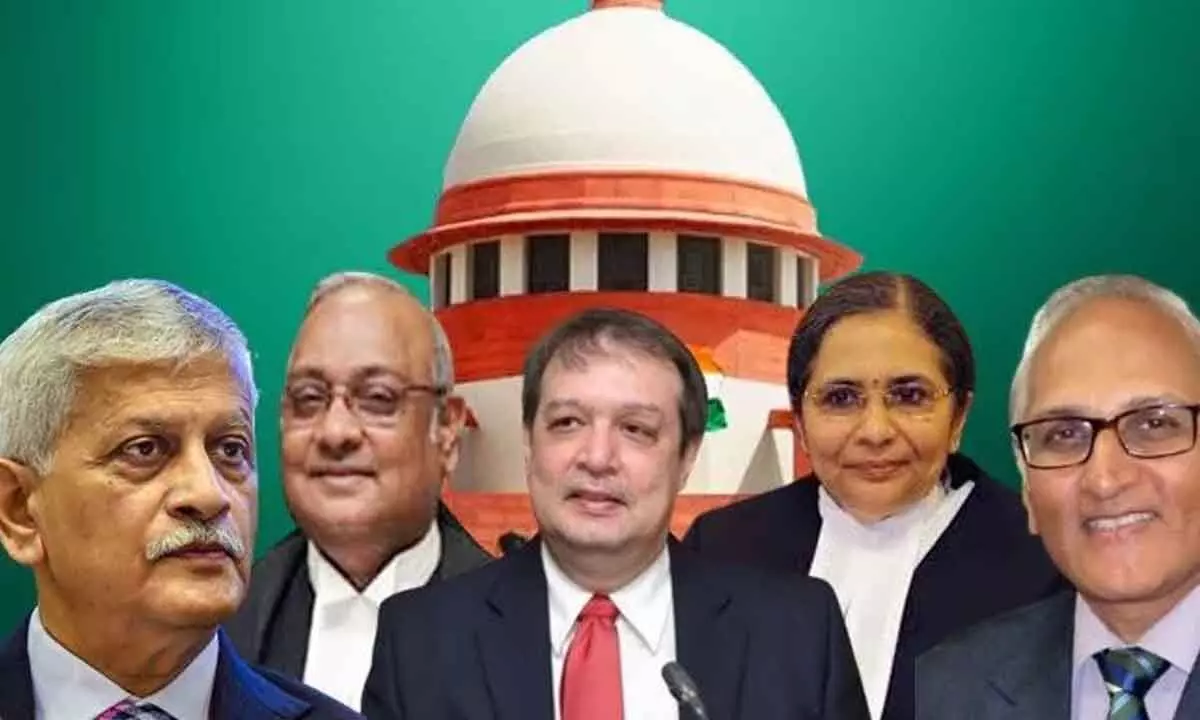Live
- India Faces Blow as Pacer Mohammed Shami Ruled Out for Remainder of Australia Series
- Farmer’s Day Celebrations Held at Palem Agricultural Research Center, Nagarkurnool
- Biden Pardon: Joe Biden Commutes Death Sentences of 37 Inmates, Including Child Killers and Mass Murderers
- South Korea: Yoon believes impeachment trial takes priority over martial law probe
- Strict Action for Non-Adherence to Time Management - DMHO Dr. Swarajya Lakshmi
- Over 13.29 lakh houses approved for rural poor in Maharashtra: Shivraj Chouhan
- District Collector Urges Timely Completion of Indiramma Housing Scheme Survey
- Digital Arrest Scam: Hyderabad Man Duped of ₹7 Lakhs by Fake Crime Branch Police Callers
- Sukhbir Badal seeks President's Police medal for officer who saved his life
- US Firm Accordion Acquires Merilytics, Launches 1,500-Seater Office in Hyderabad
Just In
In 3:2 split Verdict- Supreme Court upholds EWS quota


103rd Amendment does not violate basic structure of Constitution
Of the 5-judge bench, Justice Dinesh Maheshwari, Justice Bela M Trivedi, and Justice JB Pardiwala ruled in favour of the quota, stating that the law on reservation for EWS does not violate the basic structure of the Constitution. On the other hand, Justice S Ravindra Bhat dissented and struck down the constitution amendment on EWS quota. CJI UU Lalit concurred with him
New Delhi: A Constitution Bench of the Supreme Court, in a 3:2 majority decision, upheld the validity of the 103rd Constitutional Amendment which provides 10% reservation in government jobs and educational institutions to the 'economically weaker sections of society but excludes the poor among SCs, STs, SEBCs and OBCs from its scope.
Of the five-judge bench that delivered the verdict, Justice Dinesh Maheshwari, Justice Bela M Trivedi, and Justice JB Pardiwala ruled in favour of the quota, stating that the law on reservation for EWS does not violate the basic structure of the Constitution.
On the other hand, Justice S Ravindra Bhat dissented and struck down the constitution amendment on EWS quota. CJI UU Lalit concurred with him.
Justice Dinesh Maheshwari said the 103rd constitutional amendment cannot be said to breach the basic structure of the Constitution. "EWS quota does not violate equality and basic structure of the constitution. Reservation in addition to existing reservation does not violate provisions of the Constitution," he said.
Justice Maheshwari went on to say that reservation is an instrument of affirmative action by the state for the inclusion of backward classes. "Basic structure can't be breached by enabling state to make provisions for education," he added.
He noted that reservation is instrumental not just for inclusion of socially and economically backward classes into the society but also to class so disadvantaged.
Concurring with Justice Maheshwari, Justice Trivedi said unequals can't be treated equally. Moreover, the quota can't be struck down as discriminatory if the state can justify it, she noted.
"SEBC form separate categories. They can't be treated at par with unreserved category. Benefit under EWS can't be said to be discriminatory," she said.
Expressing her views on time span of the reservation policy, Justice Bela asserted that it cannot be said that age old caste system is responsible for reservation system in India.
While upholding the validity of EWS quota, Justice Pardiwala said reservation is not an end but a means to secure social justice. He stated that it is necessary to review the method of identification of backward classes for reservation.
"The idea of Dr Ambedkar was to bring reservation for 10 years but it has continued. Reservation shouldn't be allowed to become vested interest," he said.
Minority view
In his minority view, Justice Ravindra Bhat said that what is described as benefits by the Union cannot be understood to be a free pass, but as reparative mechanism to have a level playing field. Their exclusion discriminates equality code and violates basic structure, he said. "Reservation is contrary to the essence of equal opportunity. The 103rd amendment practices prohibited forms of discrimination," he said. He also noted that the bulk of economically weaker sections belong to SCs and OBCs.
Concurring with Justice Bhat, CJI UU Lalit said: Reservation has been provided to historically disadvantaged cannot be basis to contain other disadvantaged groups unable to progress and say that provision can't be made for EWS through amendment. Reservation through economic criteria per se not violative, he held.
Justice Bhat observed that reservations were conceived, and quotas created to offset deep-rooted wrongs on communities and castes. "Reservations designed as powerful tool to enable equal access. Introduction of economic criteria and excluding other Backward Classes, SCs, STs, OBCs, saying they had these pre-existing benefits is injustice," he stated. He argued that the exclusionary clause operates in utterly arbitrary manner, as well as against socially disaffected castes by confining them within their quotas. "[It] Denies chance of mobility from reserved quota based on past discrimination to reservations under economic criteria. Impugned amendment and classification it creates is arbitrary, results in discrimination," he said.
For these reasons, Justice Bhat struck down article 15(6) and 16(6) and held them to be violative of equality code, particularly for violating principles of non-discrimination and non-inclusion which form part of basic structure.
What is 103rd Amendment?
The 103rd Amendment inserted Articles 15(6) and 16(6) in the Constitution to provide up to 10 per cent reservation to the economically weaker sections (EWS) among non-OBC and non-SC/ST sections of the population. In other words, the amendment had changed the Constitution and introduced a quota for the poor among the so-called 'forward castes' or 'general category'.
The Bill received assent from President Ram Nath Kovind on 12 January 2019. It was notified in The Gazette of India on the same date. The 103rd Amendment came into effect on 14 January 2019.

© 2024 Hyderabad Media House Limited/The Hans India. All rights reserved. Powered by hocalwire.com






